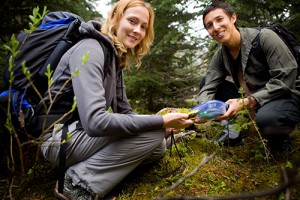 I recently helped judge a graduate poster session and was intrigued by a couple of posters highlighting research on how to use technology to engage youth and adults with nature. One of the research findings suggested that youth who use tablets to identify different plant species interact more deeply with nature. Another poster highlighted how creating games and challenges encouraged adults to get more involved with nature. This is the gamification of nature, as odd as that sounds. These got me to thinking about other ways that we can entice people to get outdoors for exercise and to discover nature.
I recently helped judge a graduate poster session and was intrigued by a couple of posters highlighting research on how to use technology to engage youth and adults with nature. One of the research findings suggested that youth who use tablets to identify different plant species interact more deeply with nature. Another poster highlighted how creating games and challenges encouraged adults to get more involved with nature. This is the gamification of nature, as odd as that sounds. These got me to thinking about other ways that we can entice people to get outdoors for exercise and to discover nature.
Geocaching
The mild winter here in the Pacific Northwest has allowed me to get out and do more geocaching. This is an activity that started in Oregon and has spread worldwide. It is essentially hide and seek using geospatial coordinates and handheld GPS devices or smartphones. A cache can be as small as a button or as big as an ammunition box or larger. When someone places a cache, they publish the geographic location on geocaching.com for others to see. They may also publish clues, in case it is hidden in an obscure place. People seeking the cache can then pick up the coordinates from the web site and find it using their GPS device. This is an excellent way to get people outside—in urban areas and wilderness—to enjoy the sights and sounds of nature. I tried to find two just this morning and one was quick and easy, the other eludes me. Even in the attempt I got in a good hike, so I still came out a winner.
There’s An App For That
Author Richard Louv coined the term “nature deficit disorder” in his 2005 book Last Child In The Woods to describe our disconnect with nature. Louv argued that some behavioral issues may be caused by a decline in how much time youth spend outdoors. Others, rightly or wrongly, conclude that youth spend so much time with technology that there is no time to explore the outdoors. I am suggesting that the same technology that is blamed for creating “nature deficit disorder” can help draw youth and adults back into nature. The graduate students at the University of Oregon are working to make that a reality. One organization promoting this shift is Agents of Nature. In partnership with various schools and public lands agencies, they have created an app that requires players to identify things in nature in order to move ahead and gain points and position. This requires them to get outside and discover things and places they otherwise might never experience.
Thoughts
I am excited about the possibility of introducing people to nature through technology. This is a way to blend our need to connect with each other and with nature. What do you think? Do people need a reason to get outdoors? Is technology a barrier or can it be a catalyst? Let me know your thoughts.
Kelly Brown is an IT professional and assistant professor of practice for the UO Applied Information Management Master’s Degree Program. He writes about IT and business topics that keep him up at night.


